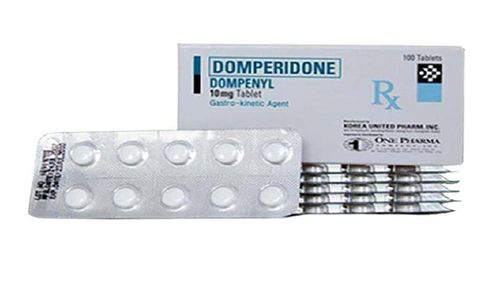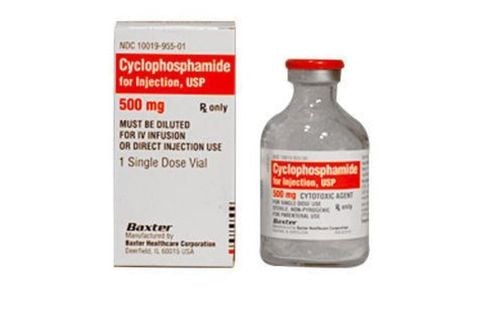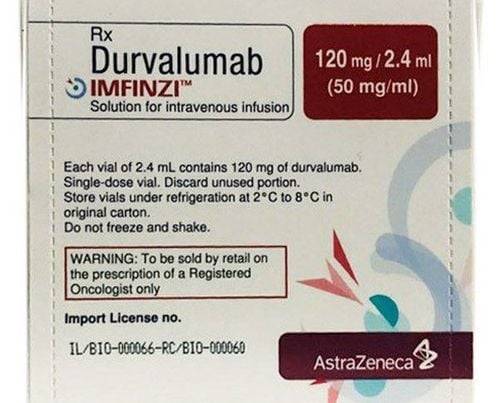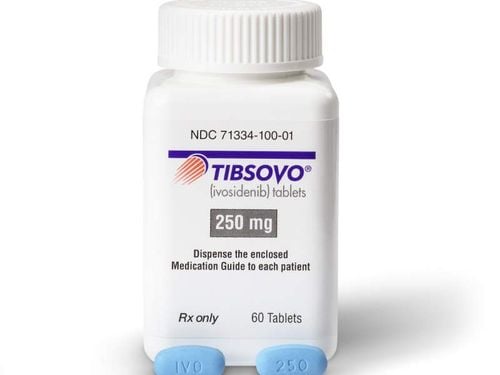This is an automatically translated article.
Inferate is made in the form of tablets, with the main ingredient being Ondansetron. It is used in the prevention of nausea and vomiting caused by chemotherapy, radiation, and surgery.
1. What is the use of Inferate?
1 Inferate tablet contains 8mg of Ondansetron (as hydrochloride dihydrate) and other excipients. Ondansetron is a highly selective 5-HT3 receptor antagonist.
Normally, chemotherapy and radiotherapy can induce the release of 5HT in the small intestine, triggering the vomiting reflex by activating the vagus nerve via the 5HT3 receptor. In addition, vagus nerve activation can also induce release of 5HT in the postrema region on the floor of the fourth ventricle, promoting vomiting via a central mechanism. Ondansetron has an antagonistic effect on 5HT3 receptors on peripheral nerves and central nervous system, helping to treat nausea and vomiting caused by chemotherapy or radiation therapy.
The anti-nausea and vomiting mechanisms of Ondansetron after surgery are not well defined, possibly also by anti-nausea and vomiting due to cytotoxicity. The drug is not a dopamine receptor blocker, so it does not cause extrapyramidal side effects.
Indications for use of Inferate:
Prevention of nausea and vomiting caused by cancer chemotherapy (especially cisplatin) when the patient is resistant or has many side effects to conventional antiemetic therapy; Prevention of nausea and vomiting caused by irradiation; Prevention of nausea and vomiting after surgery. *Note: Ondansetron should be prescribed to young patients (under 45 years of age) because these people are more likely to experience extrapyramidal reactions when taking high doses of metoclopramide when they are treated with strong emetic chemicals. . Ondansetron is also used in the elderly. Ondansetron should not be prescribed for patients treated with chemicals with low emetic potential such as 5-fluorouracil, busulfan, bleomycin, cyclophosphamide dose less than 100mg, vinblastine, vincristine.
Contraindications to the use of Inferate:
Patients with hypersensitivity to Ondansetron or other components of the drug.
2. Usage and dosage of Inferate
2.1 How to take Inferate by injection or orally.
The way to dilute the drug is as follows:
Prevention of vomiting caused by cancer chemotherapy: Ondansetron injection is diluted in 50ml of 5% dextrose or 0.9% sodium chloride, infused intravenously for 15 minutes; Prevention of postoperative nausea and vomiting: No need to dilute the drug, give it directly intravenously for a minimum of 30 seconds and preferably over 2-5 minutes. Solutions that can be used to dilute Inferate: mannitol infusion 10%, sodium chloride 0.9%, glucose infusion 5%, potassium chloride infusion 0.3%, Ringer's solution, sodium chloride 0.9 %. Note that the drug should be reconstituted immediately before infusion, ensuring sterility and only storing the reconstituted drug before infusion at 2 - 8°C, within 24 hours.
2.2 Dosage Prevention of vomiting caused by chemotherapy or radiation:
Adults: The emetic potential of chemotherapy varies with chemotherapy, dose, combination therapy and patient sensitivity . Therefore, the dose of Ondansetron is individualized, ranging from 8 - 32mg/24 hours, administered intravenously or orally. Dosage is as follows:
Usual dose: 8mg, given slowly intravenously before chemotherapy or radiation therapy or given to the patient 1-2 hours before chemotherapy or radiation therapy. Then, every 12 hours, give another 8mg. To prevent late or prolonged vomiting after 24 hours, patients can continue taking 8mg, 2 times a day 4 hours apart until 5 days after 1 course of therapy; In patients receiving chemotherapy that induces vomiting (eg, high-dose cisplatin), Ondansetron is similarly effective when the following regimens are administered during the first 24 hours of chemotherapy: a single dose of 8 mg IV slowly before when taking chemotherapy; 1 dose of 8 mg intravenously slowly before chemotherapy, followed by 2 additional doses of 8 mg intravenously 2 to 4 hours apart or as a continuous infusion of 1 mg/hour for up to 24 hours; 1 single dose of 32mg mixed into 50-100ml of infusion solution, infused over at least 15 minutes before chemotherapy; To prevent late or prolonged vomiting after 24 hours, the patient can continue to take 8mg, twice a day for 2-5 days. Children 4-12 years old: Administer 1 dose of 5mg/m2 body area (or 0.15mg/kg), intravenously before chemotherapy. Then, every 12 hours, give the patient 4mg orally for up to 4 days.
Prevention of nausea and vomiting after surgery:
Adults: Use a single dose of 4mg, slow intravenous injection or intramuscular injection when pre-anesthesia or use 16mg, give 1 hour before anesthesia; Children over 2 years old: Use 0.1mg/kg, maximum 4mg, slow intravenous injection before, during or after pre-anesthesia; Patients with hepatic impairment: Use a maximum dose of 8mg/day for patients with severe liver disease and cirrhosis; Elderly: The dose of the drug is unchanged, the same as in adults; Patients with renal impairment: There are no studies on the effectiveness and dose of the drug. Overdose: There have been cases of intravenous injection of Inferate with a dose of 145mg, a total intravenous dose of up to 252mg a day (due to carelessness) without causing complications. This dose was about 10 times higher than the recommended daily dose. Symptomatic hypotension has occurred in people taking 48mg Ondansetron. This disaster will go away completely. Currently, there is no specific treatment for Inferate overdose, patients will be monitored and treated supportively.
3. Side effects of the drug Inferate
Some side effects patients may experience when using Inferate include:
Common: Headache, fever, sedation, constipation, diarrhea; Uncommon: Dizziness, dry mouth, abdominal cramps, musculoskeletal weakness; Rare: Hypersensitivity, anaphylaxis, hypotension, arrhythmia, tachycardia, mild headache, seizures, hypokalemia, rash, purpura, transient elevations of aminotransferases and serum bilirubin, Shortness of breath, wheezing, bronchospasm, chest pain, hiccups,... Patients should inform their doctor about the side effects encountered when using Inferate to receive advice on appropriate handling. fit.
4. Be careful when using Inferate
Some notes for patients to remember before and while taking Inferate:
Ondansetron should be used for prophylactic purposes, not for treatment because the drug only works to prevent nausea and vomiting, not to cure vomiting; Ondansetron should only be used within the first 24-48 hours of chemotherapy. Research shows that the drug does not increase effectiveness when the prevention of vomiting and nausea occurs late; Use caution when using Inferate in the elderly with impaired liver function or patients with suspected intestinal obstruction; It is not known whether Inferate crosses the placenta or not, it is best not to take it during pregnancy, unless authorized by your doctor; It is not known whether Inferate passes into breast milk. Therefore, caution should be exercised when Inferate is administered to a nursing mother; Inferate has the potential to cause drowsiness and headache, so it should not be used when driving or operating machinery.
5. Inferate drug interactions
Some drug interactions of Inferate include:
Ondansetron metabolism is changed by cytochrome P450 inhibitors such as disulfiram, cimetidine, allopurinol, increasing the toxicity of the drug; Ondansetron is metabolized by the cytochrome P450 enzyme system in the liver, so drug clearance and half-life are altered when co-administered with cytochrome P450 inducers such as rifampin, carbamazepine, barbiturates, phenytoin and phenylbutazone. When using Inferate to prevent nausea and vomiting, patients should strictly follow all of their doctor's advice. This is important in improving the effectiveness of the drug and limiting possible negative side effects.
Follow Vinmec International General Hospital website to get more health, nutrition and beauty information to protect the health of yourself and your loved ones in your family.
Please dial HOTLINE for more information or register for an appointment HERE. Download MyVinmec app to make appointments faster and to manage your bookings easily.













